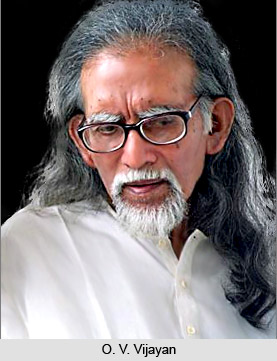 O. V. Vijayan is the central figure in the post-modernist generation. Vijayan, who was also one of the leading English-language cartoonists in India, exploded into the literary scene with his dark, brooding, profoundly unsettling novel Khasakkinte Ithihasam (The Legends of Khasak, 1965, 1994). His writing was immediately identified as athyadunikam (ultramodern), as the term "post-modern" had not come into vogue in the critical vocabulary in Malayalam literature. Vijayan continued to write masterly short stories and social critiques until the national emergency in 1975, when his second novel, the masterpiece Dharmapuranam (The Saga of Dharmapuri), was prevented from publication. Dharmapuranam seems to have been influenced by the existentialists as well as by Jonathan Swift and Laurence Sterne. However, his vision and style, in general, spring out of the classic experience of the pre-modern India, relics of which have managed to survive in the remote village and tribal cultures of Kerala. The nascent post-modernist sensibility enabled him to bring out the essence of the pre-modern in a scorching, flaming narrative style, much to the confusion of the modern progressives, who claimed certainty in the matters of life and art. His dissent to modernism was evident in his early short stories and parodies. For instance, in the story "The Progressive Classic," a woman sitting under the full moon asks her beloved, "Darling...have you read Karl Marx`s Das Kapital?`" She goes on to insist that they read The Das Kapital right away. The author asks us to fill in the blanks with the four volumes of Marx, claiming that it would make his short story the lengthiest socialist-realist novel.
O. V. Vijayan is the central figure in the post-modernist generation. Vijayan, who was also one of the leading English-language cartoonists in India, exploded into the literary scene with his dark, brooding, profoundly unsettling novel Khasakkinte Ithihasam (The Legends of Khasak, 1965, 1994). His writing was immediately identified as athyadunikam (ultramodern), as the term "post-modern" had not come into vogue in the critical vocabulary in Malayalam literature. Vijayan continued to write masterly short stories and social critiques until the national emergency in 1975, when his second novel, the masterpiece Dharmapuranam (The Saga of Dharmapuri), was prevented from publication. Dharmapuranam seems to have been influenced by the existentialists as well as by Jonathan Swift and Laurence Sterne. However, his vision and style, in general, spring out of the classic experience of the pre-modern India, relics of which have managed to survive in the remote village and tribal cultures of Kerala. The nascent post-modernist sensibility enabled him to bring out the essence of the pre-modern in a scorching, flaming narrative style, much to the confusion of the modern progressives, who claimed certainty in the matters of life and art. His dissent to modernism was evident in his early short stories and parodies. For instance, in the story "The Progressive Classic," a woman sitting under the full moon asks her beloved, "Darling...have you read Karl Marx`s Das Kapital?`" She goes on to insist that they read The Das Kapital right away. The author asks us to fill in the blanks with the four volumes of Marx, claiming that it would make his short story the lengthiest socialist-realist novel.
He confronts the Marxist Party on a regular basis as he confronted, early on, the pre-eminent socialist realist Kesav Dev about his generation`s outmoded aesthetics and their suspicion toward the expressions of the younger generation. In both cases, it was the younger modernist revolting against the older modernist on issues of form and content, literary and social.
O. V. Vijayan has remained a thoroughly Indian writer by sustaining a certain continuity of the tradition established by Vaikom Muhammad Basheer. He is able to achieve this by delving deeper into the subcultures and the subtle dialectal variations of Malayalam and simultaneously connecting his work to the postmodern condition. In Khasakinte Ithihasam, the young protagonist, Ravi, is an educated young man who loses himself in an isolated village where he volunteers to teach in an elementary school. Earlier, he had fled from the suffocating confines of modernity and all that went with it- city, college, intellectual life and a future career as an astrophysicist in the United States of America. When the village falls apart on account of the intrusion of the outside world and modernizing forces, Ravi departs, seeing himself as an intruder. But, as he waits for the bus to take him back to the city, he allows a snake to bite him. At the close of the novel, one can still see him awaiting his final journey.
In his 1986 memoir about the writing of Khasakinte Ithihasam, Vijayan has explained that his art has nothing to do with Western forms of existentialist philosophy, as has been suggested, and that he receives his sustenance from post-independence Indian realities. This intentional rejection of Western modernity is actually a mark of Malayalam post-modernism, and it is this feature which marks Vijayan as one of the most outstanding post-modernists of his time.



















